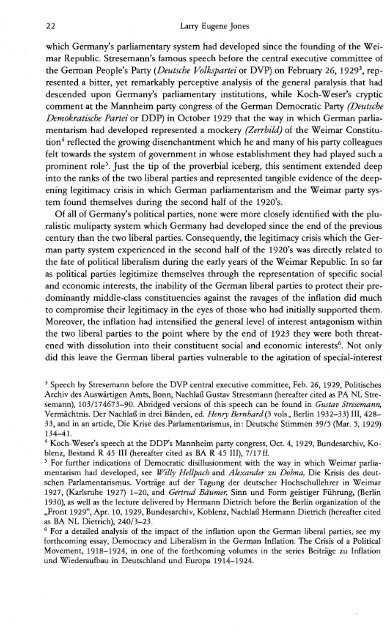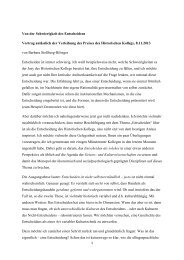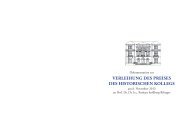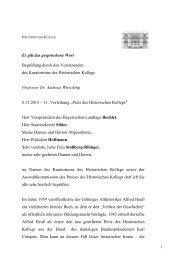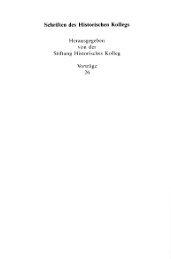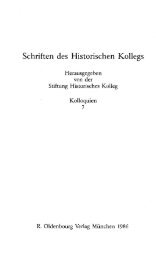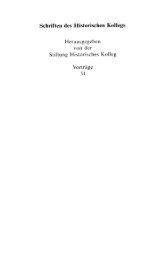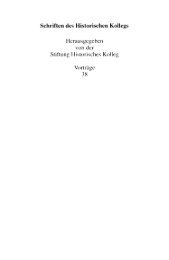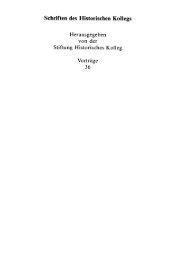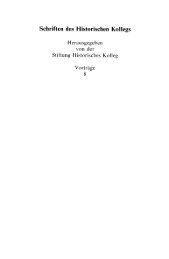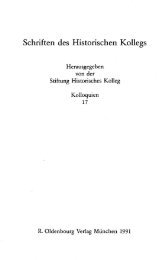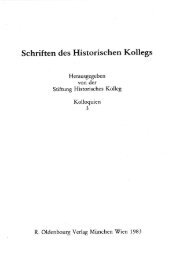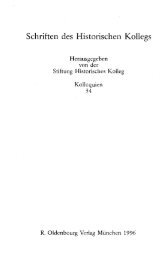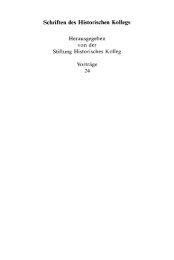Schriften des Historischen Kollegs - Kolloquien 6 - Historisches Kolleg
Schriften des Historischen Kollegs - Kolloquien 6 - Historisches Kolleg
Schriften des Historischen Kollegs - Kolloquien 6 - Historisches Kolleg
Sie wollen auch ein ePaper? Erhöhen Sie die Reichweite Ihrer Titel.
YUMPU macht aus Druck-PDFs automatisch weboptimierte ePaper, die Google liebt.
22 Larry Eugene Jones<br />
which Germany's parliamentary system had developedsince the founding of the Weimar<br />
Republic. Stresemann's famous speech before the central executive committee of<br />
the German People's Party (Deutsche Volkspartei or DVP) on February 26, 1929 3 , represented<br />
a bitter, yet remarkably perceptive analysis of the general paralysis that had<br />
<strong>des</strong>cended upon Germany's parliamentary institutions, while Koch-Weser's cryptic<br />
comment at the Mannheim party congress of the German Democratic Party (Deutsche<br />
Demokratische Partei or DDP) in October 1929 that the way in which German parliamentarism<br />
had developed represented a mockery (Zerrbild) of the Weimar Constitution<br />
4 reflected the growing disenchantment which he and many of his party colleagues<br />
feit towards the system of govemment in whose establishment they had played such a<br />
prominent role 5 • Just the tip of the proverbial iceberg, this sentiment extended deep<br />
into the ranks of the two liberal parties and represented tangible evidence of the deepening<br />
legitimacy crisis in which German parliamentarism and the Weimar party system<br />
found themselves during the second half of the 1920's.<br />
Of all of Germany's political parties, none were more closely identified with the pluralistic<br />
muli party system which Germany had developed since the end of the previous<br />
century than the two liberal parties. Consequently, the legitimacy crisis which the German<br />
party system experienced in the second half of the 1920's was directly related to<br />
the fate of political liberalism during the early years of the Weimar Republic. In so far<br />
as political parties legitimize themselves through the representation of specific social<br />
and economic interests, the inability of the German liberal parties to protect their predominantly<br />
middle-class constituencies against the ravages of the inflation did much<br />
to compromise their legitimacy in the eyes of those who had initially supported them.<br />
Moreover, the inflation had intensified the general level of interest antagonism within<br />
the two liberal parties to the point where by the end of 1923 they were both threatened<br />
with dissolution into their constituent social and economic interests 6 . Not only<br />
did this leave the German liberal parties vulnerable to the agitation of special-interest<br />
3 Speech by Stresemann before the DVP central executive committee, Feb. 26, 1929, Politisches<br />
Archiv <strong>des</strong> Auswärtigen Amts, Bonn, Nachlaß Gustav Stresemann (hereafter cited as PA NL Strese<br />
mann), 103/174673-90. Abridged versions of this speech can be found in Gustav Stresemann,<br />
Vermächtnis. Der Nachlaß in drei Bänden, ed. Henry Bernhard (3 vols., Berlin 1932-33) III, 428-<br />
33, and in an article, Die Krise <strong>des</strong> Parlamentarismus, in: Deutsche Stimmen 39/5 (Mar. 5, 1929)<br />
134-4l.<br />
4 Koch-Weser's speech at the DDP's Mannheim party congress, Oct. 4,1929, Bun<strong>des</strong>archiv, Koblenz,<br />
Bestand R 45 111 (hereafter cited as BA R 45 111), 7/17 ff.<br />
5 For further indications of Democratic disiIlusionment with the way in which Weimar parliamentarism<br />
had developed, see Willy Hellpach and Alexander zu Dohna, Die Krisis <strong>des</strong> deutschen<br />
Parlamentarismus. Vorträge auf der Tagung der deutscher Hochschullehrer in Weimar<br />
1927, (Karlsruhe 1927) 1-20, and Gertrud Bäumer, Sinn und Form geistiger Führung, (Berlin<br />
1930), as weIl as the lecture delivered by Hermann Dietrich before the Berlin organization of the<br />
"Front 1929", Apr. 10, 1929, Bun<strong>des</strong>archiv, Koblenz, Nachlaß Hermann Dietrich (hereafter cited<br />
as BA NL Dietrich), 240/3-23.<br />
6 For a detailed analysis of the impact of the inflation upon the German liberal parties, see my<br />
forthcoming essay, Democracy and Liberalism in the German Inflation. The Crisis of a Political<br />
Movement, 1918-1924, in one of the forthcoming volumes in the series Beiträge zu Inflation<br />
und Wiederaufbau in Deutschland und Europa 1914-1924.


